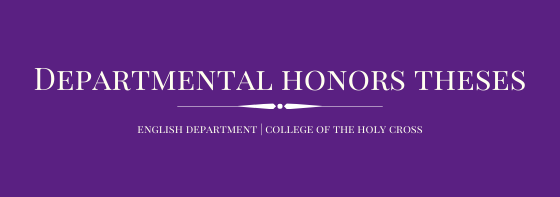
Date of Creation
5-2024
Document Type
Departmental Honors Thesis
Department
English
First Advisor
Nadine Knight
Abstract
Dystopian fiction has long been a vehicle for exploring societal issues and envisioning potential futures. Although many view the genre as a form of escapism, these novels have the potential to make grand statements about the nature of humanity. From George Orwell's 1984 to Octavia Butler's Parable of the Sower, these narratives serve as a reflection of our current societal standing and project potential consequences of our collective actions. However, within the realm of dystopian literature, there exists a significant gap in equal representation of the experiences and unique perspectives of the Black community. Specifically, within the context of the urban city of Boston. This thesis seeks to explore the different ways dystopian fiction portrays and intersects with the experiences of the Black community in the greater Boston area. By shedding light on the unique challenges, resilience, and narratives of change within the demographic we can employ a holistic approach to the reclamation of a quality lifestyle for Black people. This thesis argues that dystopian fiction serves as a powerful tool for the representation of Black communities in Boston and ways in which the city can improve for the benefit of its marginalized citizens. Through critical analysis and engagement with these texts, readers are invited to question existing power structures, and envision pathways towards communal welfare and self advocacy. Ultimately, this thesis seeks to contribute to ongoing conversations about representation, resistance, and the transformative potential of storytelling within the context of dystopian fiction and Black communities in Boston.
Recommended Citation
Guerrero, Leonersy J., "Dystopian Novels and The Greater Boston Area: A Reflection on Privilege" (2024). English Honors Theses. 18.
https://crossworks.holycross.edu/engl_honor/18
Included in
English Language and Literature Commons, Race, Ethnicity and Post-Colonial Studies Commons

